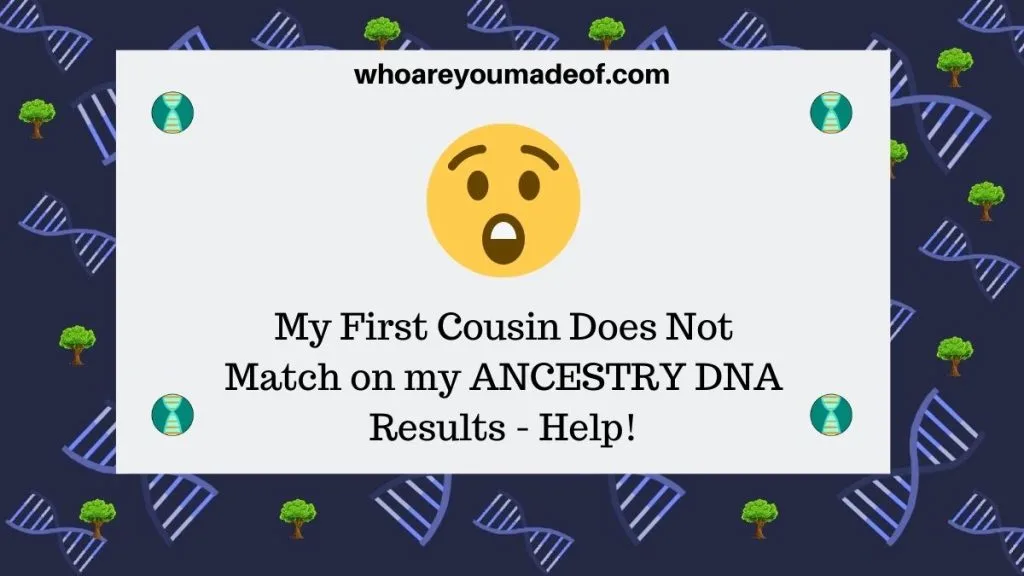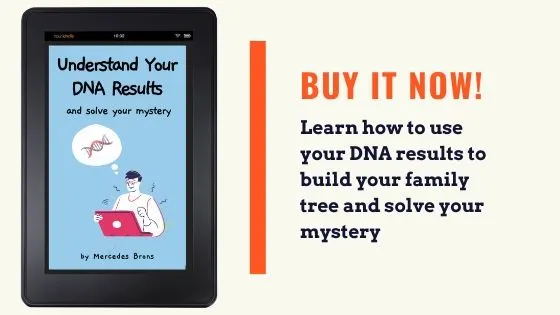Are you worried that your first cousin does not match on your DNA results? In this post, learn reasons why this might have happened and what to do next.
More often than you might expect, people are surprised by their DNA results. It can be disappointing or shocking to expect someone to be genetically related to you, but find out that they are not. This article discusses what it means if a first cousin does not show up on your DNA match list.

If you just got your results today: It can sometimes take a few days for your matches to "populate" on our DNA match lists. If you just got your test results back today and you don't see someone that you are expecting to see on your match list, I would recommend waiting for a few days before coming to any definite conclusions.
Is it possible for first cousins to share no DNA?
First cousins will always share DNA. This is true for both full first cousins and half-first cousins, as there is always a shared genetic connection between these relatives.
It's also true that that with every generation of descendants, a little less DNA is inherited from the common ancestor or pair of ancestors, like grandparents in the case of first cousins. However, when it comes to first cousins, so much DNA is shared by their parents, whether they were full or half-siblings, that it is statistically impossible for first cousins to share no DNA.
How much DNA should first cousins share?
Even though first cousins will always share DNA, the amount that they can share can very dramatically from as little as 215-1330 centimorgans (cMs). There will be more DNA shared by full first cousins than there is by half-first cousins.
Full first cousins will share DNA falling in the last half of the range mentioned above, and half-first cousins will share DNA towards the bottom end of the range. Further down in this article you will find more specific shared DNA details.
It's normal to have this wide range of possible shared DNA between first cousins. Since DNA is inherited randomly from each parent, there is no way to know or control which DNA is inherited.
The only thing that is important to remember for this discussion is that first cousins always share DNA. Below, you will find details about shared DNA between full and half-first cousins.
Full first cousins (cousins whose mother or father were full siblings to their cousin's mother or father)
Full first cousins who share two grandparents will share an average of 12.5% DNA. Using centimorgans (cMs) as a measurement, this means that first full cousins will share between 535-1330 cMs.
Half-first cousins (cousins whose mother or father were half-siblings to their cousin's mother or father)
Half-first cousins will share an average of 6.25% DNA, or between 215-650 cMs. These cousins share only one grandparent because their parents were half-siblings.
What does it mean if my first cousin doesn't match my DNA?
The most common result that people find when they look at their cousin matches is that they share less DNA than they expected with their first cousins. This usually means that their parents were not full siblings (see DNA shared between half-first cousins above).
When there is no DNA shared between first cousins, however, it means one of two things:
- One of the first cousins belongs to a different genetic family
- One of the parents of the first cousins belongs to a different genetic family
In order to figure out which of the above situations is most likely, you should look at the DNA results of both cousins and look for the following clues:
- Does either cousin have close family matches who are in the biological family that you were expecting them both to belong to?
- Do you see familiar surnames in the family trees of any of the matches?
- Are there close matches on the DNA list that you don't recognize?
There are a few rare medical treatments, such as a bone marrow transplant, that can cause unexpected DNA results, so this is something to keep in mind before discussing any conclusions that you have about your DNA list with family. If you or your cousin has a procedure like this, this could explain unexpected results.
Obviously, finding out that someone is not a genetic match to you can be a very sensitive topic, and I recommend proceeding with caution when deciding what to do with your newly-discovered knowledge.
It is also completely acceptable to keep this knowledge to yourself, if you feel like it is most appropriate to do so.
Pro tip: Most importantly, we consider those who we love to be family - so don't let the amount of DNA that you share with someone affect your relationship, or how you feel about them.
Can the test results be wrong?
DNA match lists are almost never wrong. There are very rare instances of accidents happening, such as when a couple or friends take their tests together and accidentally place their tubes into the other's envelope to send to the lab.
The only times when the test has been "wrong" has been in rare circumstances when there have been medical treatments that would affect these types of DNA tests, as mentioned above. Read the 23 and Me note about bone marrow transplants, for example.
You can easily tell whether your DNA match list is accurate by examining the names of the relatives that you see. If you see any names that you recognize, your results are correct, since it would not be possible for results to only be partially correct. If there are no familiar names, it does not necessarily mean that your results are inaccurate, however.
If you did not test with AncestryDNA, 23andMe, MyHeritage, Living DNA, or Family Tree DNA, and you are surprised by your results, I would recommend testing again with one of these autosomal DNA testing companies before you come to any definite conclusions.
Having more relatives do a DNA test is a great way to figure out why your cousin doesn't match you
If, after careful examination, it does appear that your DNA results are correct, and that your cousin's results are, too, which of course they most likely are, the next thing that you might want to do is try to figure out why. It is not required, but many people like to try to determine whether what they know about their ancestry is accurate.
The best way to do this is to have more family members do DNA tests. Older family members are the best people to test, with their knowledge and permission, of course, because their DNA will provide the most helpful information.
It's best to do additional DNA tests with the same company that tested you and your cousin's DNA. This way, everyone shows up in the same database and you can see which matches everyone shares in common and exactly how much DNA everyone shares with another.
Conclusion
I hope that this article has helped you understand how much DNA first cousins typically share, and what it means when first cousins share less DNA than expected. If you have any questions about anything that I mentioned, or would like to discuss your particular DNA results, please leave a comment.
Thanks for stopping by!


Cecilia Hernandez
Saturday 7th of January 2023
I'm curious why DNA is shared on Ancestry even though it shows we are not a match?? Would love to hear from you. Thank you, Cece
William Schulze
Friday 29th of April 2022
Hello. Wonderful article! I have a question about DNA and nationalities. My GG Grandfather came over from the "old country". My Grandfather had two children with his wife my Dad and his sister. I asked my Aunt and her oldest to do the Ancestry DNA kit. Both cane back as matching their respected family positions with me, looking at the Centimorgan #'s. But, l do not share any percentage of "old country" DNA with either of them. Is that due to the randomness of DNA transfer?
Clare Kent
Tuesday 7th of December 2021
I have a full first cousin 1 x removed and share 308 cM across 15 segments. We only share 4 dna matches that relate to only my grandfather. Although my cousin didn't do a test herself, my aunt did and there is nothing out of the ordinary there. Is it incorrect to expect to share a lot of dna matches with him and at least some relating to my grandmother?
Mercedes
Thursday 6th of January 2022
Hi Clare, A full first cousin once-removed should share all close DNA matches that are closely related to the grandmother and grandfather. However, it is important to note that we don't share DNA with all of our relatives, which means that if the shared matches are related at a third cousin distance or further, there may not be any shared DNA between them. Testing closer relatives is the best way to determine relationships. I hope this helps. Sincerely, Mercedes
Ryan
Sunday 25th of July 2021
My first cousin and I are proven to have the same grandparents but we don't show up on each other's match list. I will never understand why unless the company admits to it's mistake.
Cec
Saturday 7th of January 2023
@Ryan, Same thing on my tree for quite a while then it showed up later on for some reason,
Suzanne G McClendon
Monday 11th of April 2022
@Ryan,
Does this mean that your grandparents were DNA tested, too? The reason I ask is that I have a thought about what could have happened, aside from the DNA company making a mistake.
DNA inheritance is random and, though not typical, I think it is completely possible for 1st cousins not to have a match, even with parents being full siblings.
For example, let's use two sisters and a child from each of them. What if on each chromosome, the sisters each gave their child the opposite grandparent's DNA, throughout all of the chromosomes?
Maybe Sister #1 gives her child Grandpa's DNA on the left side of Chromosome 1 and Grandma's DNA on the right side of Chromosome 1.
Sister #2 gives her child Grandma's DNA on the left side of Chromosome 1 and Grandpa's DNA on the right side of Chromosome 1.
It seems to me that this would be rare, but could still be possible.
Lee
Tuesday 30th of March 2021
Hi, my father left when i was young, i grew up with horrible stories about him. 2 yrs ago im 44 i decided to go look. He died homeless 15 yr ago. So i start researching to find family members, i have dna tested 2 cousins, and neither share any dna with me, they do with each other. I feel so lost and really want to hirt my mother, as her vile lies all my life have left me not knowing who i am.